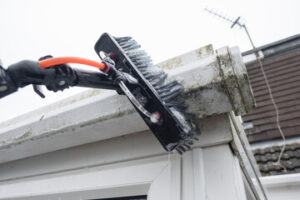Charleston Gutter Cleaning may seem like a small task, but it has far-reaching implications for your entire community. It’s important to keep gutters clean so they can drain properly and prevent water damage.

Regular gutter maintenance protects your home’s foundation, averts basement flooding, halts landscape erosion, and decreases staining and mold development. It also extends the lifespan of your roof, walls, and foundation.
Gutter cleaning can help prevent damage to your roof, walls, windows and other parts of the home. Gutter cleaning can be done yourself or with the assistance of a professional. The best time to do gutter cleaning is in the spring and fall. This will prevent leaves and debris from building up in the gutters.
If you see water spilling over the sides of your gutters, this is a sign that the downspouts are clogged. It is important to keep your gutters clean so that the rainwater can flow through the downspouts and away from your house.
Gutters and eavestroughs are designed to hold the weight of water but not built to hold gunk, dirt, plant growth, twigs and other debris. When these items clog the gutters and downspouts, they become incredibly heavy and can bend, sag and even detach from the fascia boards. This can cause a lot of damage that could be costly to repair or replace.
Another sign that your gutters are clogged is if you notice that there is mold or stains on the side of your house. If the gutters are clogged, the rainwater can’t escape and it will run down the side of your home and cause stains and water damage. This can be very expensive to fix and may require a new siding for your home.
A clogged gutter can also cause flooding in the basement of your home. This can be very expensive to fix and can also lead to mold growth, which can be very dangerous for your health.
A clogged gutter can also cause erosion around the foundation of your home. This can cause cracks and voids in the concrete, which can be very costly to fix. Gutter cleaning can prevent erosion and help protect your home’s foundation. It is important to clean your gutters regularly, and keep nearby trees trimmed to minimize the amount of debris that ends up in your gutters. It is important to inspect your gutters and downspouts on a regular basis to ensure they are working properly.
Clogged downspouts can lead to flooding
The water that spills over clogged gutters can damage your roof, siding, and foundation. It can also lead to flooded basements, where water seeps into the home’s structure and cause serious problems. Adding a gutter downspout filter to your gutter system can help prevent this issue, but regular cleaning and inspection are still important.
If you have a gutter downspout clog, the first step is to flush it out with a garden hose. Insert the nozzle into the gutter downspout and turn on the water. This will force the clog upward and out of the downspout. If this doesn’t work, try inserting a plumbing snake into the bottom of the downspout and twisting it to break up any debris. Finally, flush out the downspout again with a hose and check for flow.
Most clogs in gutter downspouts occur near the “elbow” section, where it meets the gutter. If this is the case, you can often remove the clog by removing the elbow and extending the downspout to the ground level. Then, using a shovel or trowel, dig out any dirt or debris that has accumulated near the downspout elbow. You can also use a garden augur tool to loosen and remove any stubborn clogs.
In some cases, a persistent or frequent clog in your gutter downspout may be due to an underlying problem with your gutter system or the design of the home’s drainage system. A professional gutter cleaning service can evaluate your downspouts and recommend any adjustments needed for proper drainage.
Clogged gutters are a common household nuisance that can affect your home’s structure, roof, siding, and foundation. The good news is that you can easily and safely clean your gutter downspouts with the right tools. If you do your maintenance regularly and follow best practices, your gutter downspouts will flow freely and keep your home safe from damage and flooding. For stubborn or recurring gutter downspout clogs, a professional gutter cleaning can save you time and money while ensuring that your downspouts are properly functioning. Adding a specialized clog removal tool to your gutter cleaning tool kit can also make this task even easier.
Clogged gutters can lead to mold growth
Clogged gutters block water flow, causing it to overflow and damage the roof, walls, and foundation. The constant contact with moisture can also lead to wood rot and pest infestations. Regular gutter cleaning can prevent these problems and extend the lifespan of your home’s roof and foundation.
Clogging and overflowing gutters are breeding grounds for mold and mildew, which can contaminate the air that circulates throughout the home. This contaminant may trigger allergies and respiratory distress in sensitive individuals. Gutter maintenance, coupled with a multi-prong approach involving HVAC filters and air hygiene practices, can significantly reduce the amount of avoidable allergens, pathogens, and toxins circulating through the living space.
Ideally, gutters collect and channel rainwater into downspouts, which then drain the excess water away from the home’s structure and landscaping. This helps to prevent erosion, prevent flooding, and preserve the integrity of the foundation. However, if the gutters become clogged with dirt, sticks, and leaves, they cannot do their job. Water that overflows or pools in the gutters causes soil erosion, which can wash away plants and expose tree roots. It can also erode the soil around the home’s foundation, which can cause cracks and structural instability.
Dirty, clogged gutters also make it difficult for the downspouts to drain the water properly. As a result, the moisture can seep into the attic and insulation, causing mold and mildew. The spores can then spread through the ventilation system and contaminate the entire living space. Clogged gutters are a perfect breeding ground for mosquitoes, flies, and rodents. Regular gutter cleaning can help prevent these infestations by removing the nesting sites.
In addition to promoting the health and longevity of your home’s roof, foundation, and landscape, proper gutter maintenance also saves money on repair and replacement costs. Replacing rusty or mold-damaged gutters, siding, and insulation is expensive. Preventing these damages with regular gutter cleaning can help you save thousands in repairs and replacement costs.
Clogged gutters can lead to structural damage
Gutters might seem like a minor detail to some homeowners, but they are essential to the health and longevity of your home. When clogged, they can lead to serious structural damage and environmental issues. Among other things, they can cause foundation damage, water intrusion into the walls and roof, and pest infestations.
Gutter systems are designed to deflect rainwater and snow away from the house. However, if they become clogged with debris, this can lead to overflows and water pooling around the foundation. This can damage the soil and foundation, leading to cracks in the walls and basement flooding. The excess moisture can also encourage mold and mildew growth, which can damage or stain your siding.
The stagnant water in clogged gutters is an ideal breeding ground for mosquitoes and other pests. In addition, the clogged gutters can create the perfect environment for rodents and birds to build nests. Pest infestations can then spread to other areas of the home, causing further problems and costing money for extermination services.
Standing water can also rot the wood in gutters and fascia boards, which may cause them to sag, pull away from the wall, or collapse entirely. Over time, clogged gutters can also lead to rust, which can deteriorate the metal and cause it to wear out prematurely.
Overflowing water from clogged gutters can also erode the soil around your foundation, leading to shifting and cracks. In the longer term, this can compromise the foundation’s stability and eventually lead to costly repairs or even a full foundation replacement.
A clogged gutter can also cause damage to the shingles on your roof. As water overflows, it can seep under the shingles and cause them to rot. This can also deteriorate the underlayment and lead to leaks, which will require costly repair or even a full roof replacement.
Gutter cleaning and regular maintenance is essential to the health and longevity of your home. In order to protect your investment, it’s important to prioritize regular cleaning and maintenance. Gutter guards can help prevent clogging, and hiring professional gutter cleaners is an affordable way to ensure your home’s health and safety.








